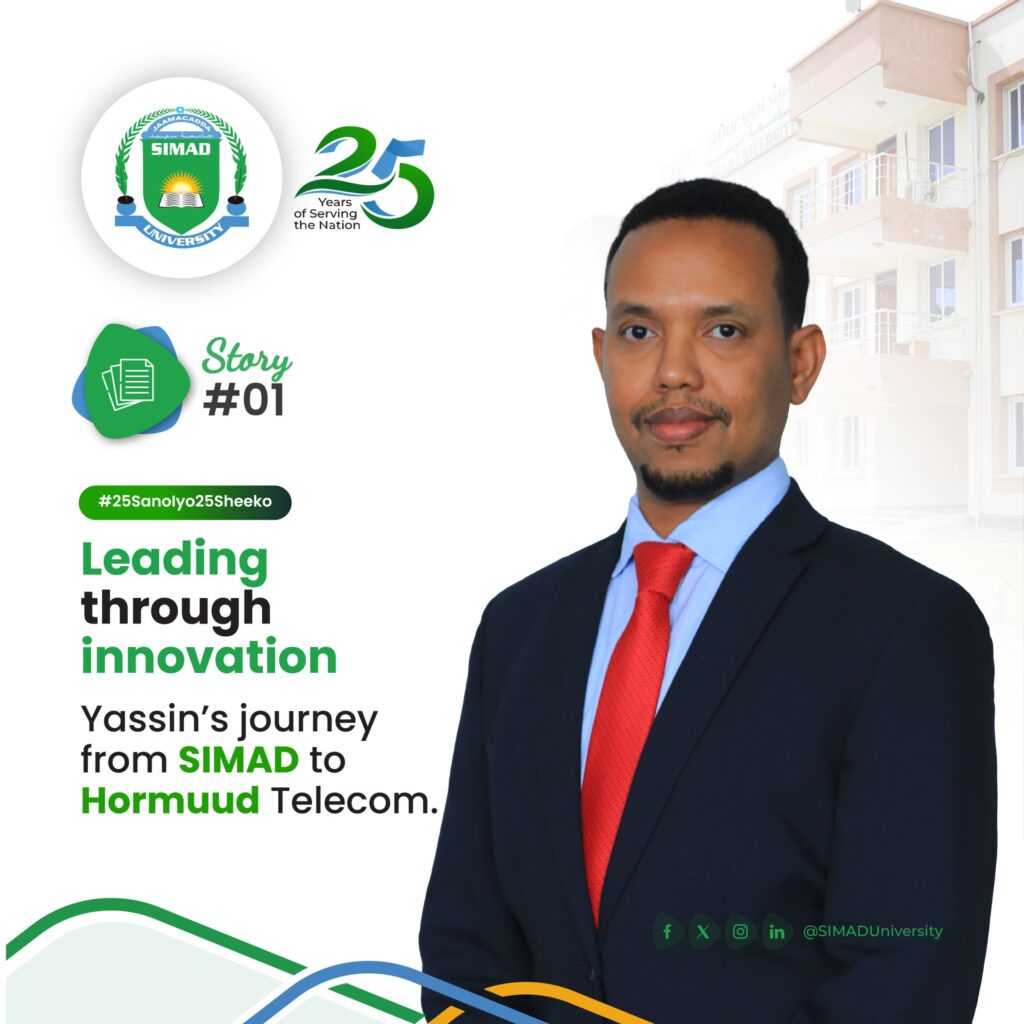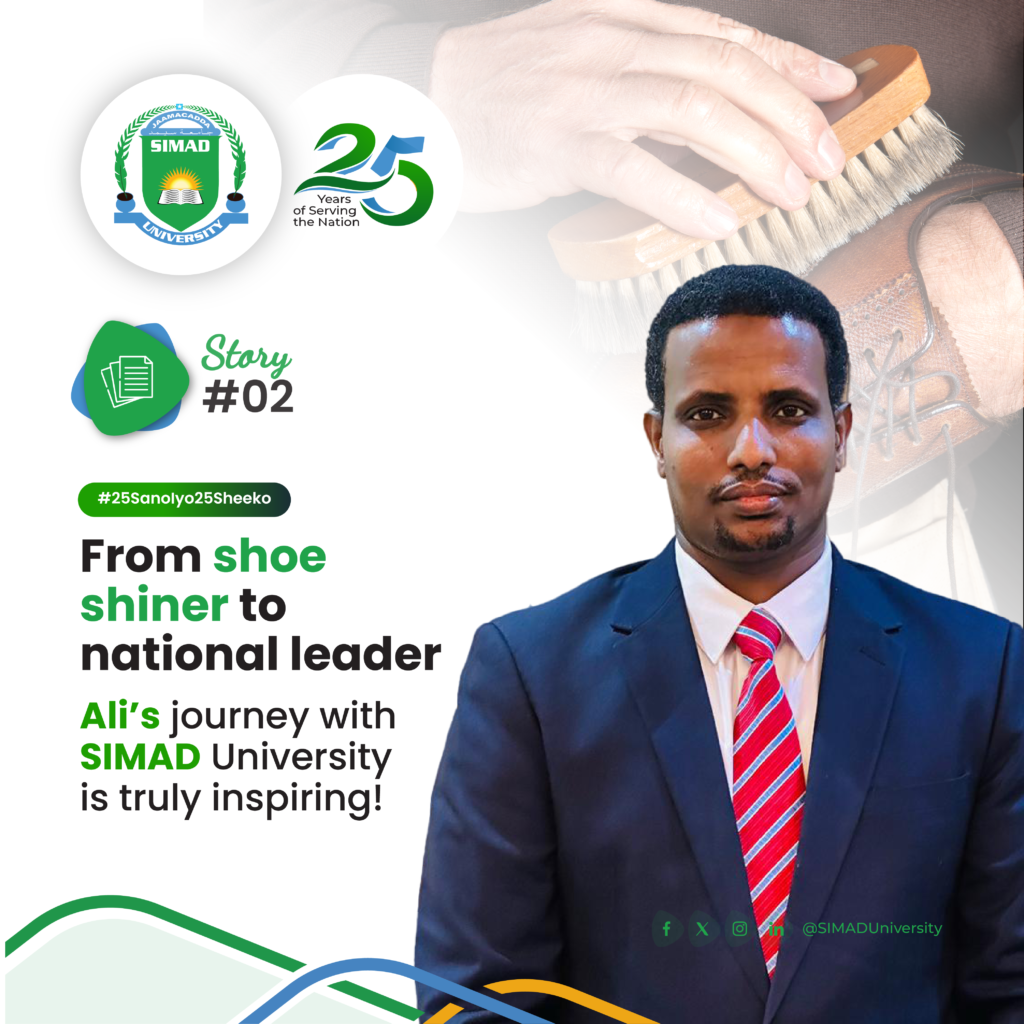Sayid Ali Abdi, a 2006 graduate of SIMAD University, stands as a proud testament to the institution’s transformative impact, both on his life and on Somalia. Now the Area Manager for the Norwegian Refugee Council (NRC) in Mogadishu, Sayid oversees operations in three federal member states and the regional office, playing a crucial role in providing humanitarian aid in a country scarred by decades of civil war and displacement.
Reflecting on his journey, Sayid remembers his time at SIMAD as one of immense challenge and resilience. He enrolled in 2003, at a time when SIMAD was still an institute offering only two courses: IT and Accounting. Despite the limited options and the turbulent political landscape, Sayid and his classmates were driven by a shared commitment to education and self-improvement.
Somalia, in the early 2000s, was a country in turmoil. Mogadishu, the nation’s capital and home to SIMAD, was controlled by warlords, and the city frequently erupted in clashes. Militia violence, roadblocks, and stray bullets were a daily reality, making the simple act of attending class a dangerous endeavor. Transportation was scarce, with students relying on minibuses to travel across the city. Yet, amidst this chaos, SIMAD became a beacon of hope for Sayid and many others.
“I remember the setup of our classes—it was very basic, more like a primary school. We used chalk on blackboards, and the technology we had was outdated. We were using Windows 98 at a time when smartphones were non-existent, and there was no internet access,” Sayid recalls. Despite the lack of resources, the faculty and administration at SIMAD persisted. The university installed a VSAT satellite internet system in Sayid’s final year, marking a major leap forward at the time, though it seems minor compared to today’s advancements.
Even in those difficult times, SIMAD’s leadership was forward-thinking, bringing in international lecturers from Pakistan, Uganda, and Kenya to ensure that students received a quality education. Their dedication, coupled with the resilience of students like Sayid, laid the foundation for SIMAD’s future growth.
Today, Sayid sees a different SIMAD. The once modest institute has transformed into a thriving university with multiple campuses, smart classrooms, and a diverse range of academic programs. “The SIMAD of today is unrecognizable compared to when I was a student,” Sayid reflects. “It has evolved into an institution that not only educates but also nurtures the future leaders of Somalia.”
The bond between SIMAD alumni is strong. “Wherever you go, if you meet a fellow SIMAD graduate, you feel an instant connection,” he says. SIMAD’s graduates are now found in every sector—government, business, and humanitarian work—making significant contributions to the country’s development. Sayid himself regularly encounters SIMAD graduates when recruiting for positions at NRC, a testament to the university’s ability to produce skilled and capable professionals.
As Sayid looks to the future, he envisions SIMAD reaching even greater heights. He believes that with its strategic direction, SIMAD has the potential to compete with the world’s top universities. “I have no doubt that SIMAD can achieve this. The younger generation, full of energy and ideas, is key to Somalia’s future. If they are empowered and given the right opportunities, the future of our country is bright.”
Sayid acknowledges the challenges that still exist—market saturation for graduates, limited job opportunities, and the lure of migration to Europe. Yet, he remains hopeful. He sees a growing diaspora returning to Somalia, attracted by the country’s slow but steady progress. For Sayid, SIMAD’s role in this transformation is undeniable. “SIMAD has produced many leaders, including ministers, and even the president is among its founders. Its contribution to Somalia is immense.”
As SIMAD University celebrates its 25th anniversary, Sayid Ali Abdi’s story is a powerful reminder of the institution’s enduring legacy. From the tumultuous days of war to its current role as a leading university in Somalia, SIMAD has shaped not only the lives of its students but also the future of the nation. In Sayid’s words, “SIMAD stands for being fit for purpose, and its impact on Somalia is nothing short of extraordinary.”


